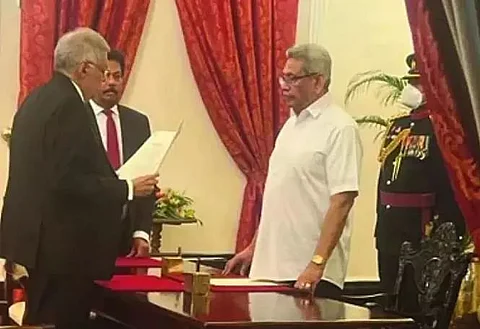
- Home
- Live Blog
- Breaking News
- Top Headlines
- Cities
- NE News
- Sentinel Media
- Sports
- Education
- Jobs

Amitava Mukherjee
(amitavamukherjee253@gmail.com)
There are quite a few reasons why Gotabaya Rajapaksha, the President of Sri Lanka, has appointed Ranil Wickremesinghe as the Prime Minister of the country. First, Wickremesinghe is known to be close to the Rajapakhsha family and it is more than likely that he will try to save both Gotabaya and Mahinda Rajapakhsha from public wrath. If that is to be done then the first requirement is to ease the economic pressure that the people of Sri Lanka are now burdened with.
Let us see what is Ranil Wickremesinghe's record in this regard. His name carries conviction with the International Monetary Fund(IMF). On a previous occasion he had duly carried out IMF prescriptions for recovery of the country's monetary health. He had raised the level of taxation particularly on the rich corporations, but at the same time provided a safety net for the common people. This had led to a healthy state coffer and had earned respectability for his country in the eyes of international financial institutions. Some other measures of fiscal discipline like tightening up of money supply and attempts to raise the GDP level were also put to practice by him.
In international politics Ranil Wickremesinghe is known to be a pro-India person. Did New Delhi have any hand behind his selection? It will be prudent not to speculate. But there were wild and unfounded rumours on the streets of Colombo as to India's role at this juncture. Some said Mahinda Rajapakhsha had taken shelter in India. Admirably the Indian High Commission in Sri Lanka denied it. Later it was found that Mahinda has, in fact, taken shelter in a naval facility of the Sri Lankan armed forces. Then again there was irresponsible speculation that New Delhi will send its army to Sri Lanka. This was also stoutly denied by New Delhi.
But behind all these unfounded rumours there may be a deeper import - the people of Sri Lanka are now perhaps yearning for Indian shadows over their country's internal and foreign policies. The expectation may have become stronger with Wickremesinghe's selection as the country's Prime minister. He comes from an elite family of Sri Lanka. His maternal grandfather was a media baron who published several newspapers and was a champion of Sri Lanka's freedom movement. Ranil's paternal grandfather was one of the earliest top ranking officials of the colonial government. Wickremesinghe's father had succeeded his father-in-law in the latter's media business and had become one of the mentors of the United National Party (UNP), to which Ranil now belongs.
Inside the UNP Wickremesinghe is no doubt a leading light which is to some extent due to the reflected glory of his family connections. JR Jayawardena, a former President of Sri Lanka who is credited with the revival of the UNP in Sri Lankan politics, is Ranil's maternal cousin. At different points of time Ranil Wickremesinghe has served different governments of his country but, to say the truth, he has not been able to leave any fundamental mark on his country's governmental policies as has been done by Sirimavo Bandarnaike or her daughter Chandrika Kumaratunga.
The sudden turn of events has come as a godsend opportunity for India because beneath the public outrage against skyrocketing inflation and a crumbling economy lies an unmistakable strain of anti-China feelings. The crisis was exacerbated by a sharply falling foreign exchange reserves which was, in turn, caused by rapidly rising debt servicing burden. According to one estimate about one-third of Sri Lanka's all external debts can be linked to China and Colombo's debt burden amounts to more than 45 percent of its GDP. So much so that Colombo has been forced to lease out the Hambantota port to Beijing as the island-nation is unable to pay off the debt.
Both the Rajapakhsha brothers lack in foresight. Mahinda is principally responsible for ensnaring the country in external debts. The situation has become so perilous that Colombo was unable to pay for import of chemical fertilizers. Bio fertilizer is good but it requires a considerable time for a change over from chemical to this type of manure. As a result agricultural production nosedived leading to severe inflation of edible items. Sri Lanka's national income fell short compared to national expenditure. So foreign exchange reserve plummeted and the country was unable to import medicines and other necessities even in Covid-19 situation.
Ranil Wickremesinghe has hoped for a closer relationship with India. It is logical because India has stood by Sri Lanka in its hour of crisis. New Delhi has extended $3 billion to Colombo in form of loans, credit lines and credit swap. But for New Delhi the most important thing to watch is whether Ranil Wickremesinghe's reinstatement at the centre of Sri Lankan politics leads to a reappraisal of the island-nation's geostrategic policy.